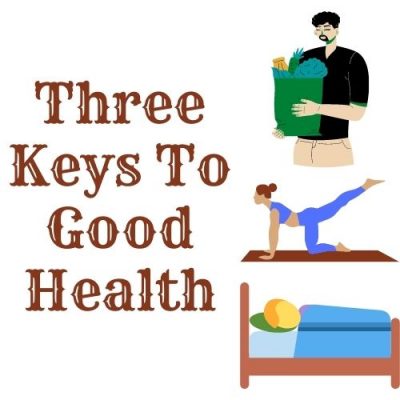6 Best Heart Rate Monitor for Seniors Without Smartphone

Seniors have always known the importance of taking care of their health, but heart rate monitors make it much easier to do. Tracking your heart rate daily helps maintain fitness levels, avoid overexertion, and manage cardiovascular health. For those not too keen on smartphones, finding a heart rate monitor that functions without an app is crucial.
In this review, we dive into the best heart rate monitors that do the job, without the smartphone. So, grab your reading glasses because you’re about to embark on a journey of practical health tools that require no tech wizardry.
Affordable dietary supplements for seniors
Best Heart Rate Monitor for Seniors without Smartphone
1. Omron HeartGuide
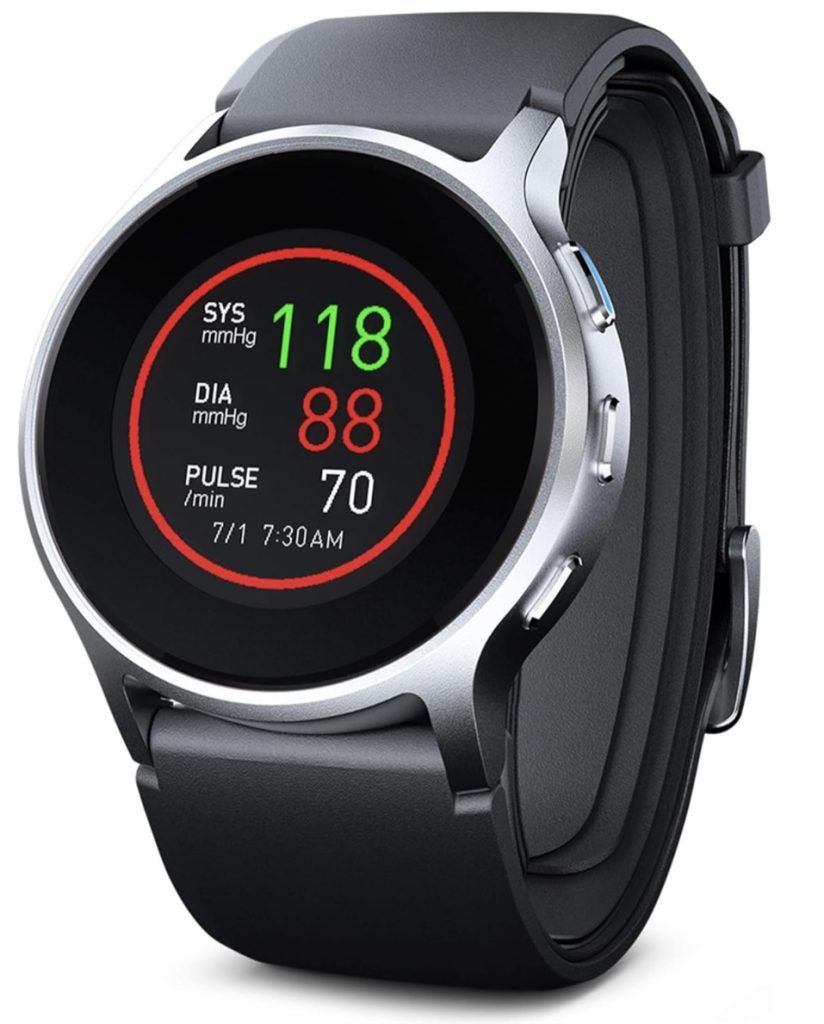
The Omron HeartGuide might sound like something from a sci-fi movie, but it’s a real deal for seniors looking for simplicity and accuracy. Designed like a wristwatch, it tracks your heart rate and monitors your blood pressure. Here’s why it made our list.
| Feature | Description |
|---|---|
| Design | Watch-style with adjustable strap |
| Heart Rate Tracking | Monitors heart rate and blood pressure |
| Battery Life | Up to 2 days on a single charge |
| Ease of Use | One-button operation, large display |
| Comfort | Lightweight, suitable for daily wear |
Pros
- Easy to Use: With a big screen and large font, it’s readable for seniors without squinting.
- Accurate Readings: Measures blood pressure and heart rate simultaneously, which is rare.
- Stylish Design: The watch-style device looks sleek, not medical.
Cons
- Battery Life Could Be Better: With only two days on a full charge, it requires frequent recharges. Not ideal for those who prefer less maintenance.
- Pricey: It falls on the higher end of the price spectrum.
Who Should Consider It?
This is a fantastic choice for seniors who want a reliable heart monitor and blood pressure tracker all in one. If you’re not one to fuss over extra gadgets, and prefer something you can wear and forget, Omron HeartGuide delivers.
2. Polar H10

For those who find wrist monitors annoying or cumbersome, the Polar H10 comes through. This chest strap-style monitor is an excellent option for active seniors or anyone who wants pinpoint accuracy. It skips the app requirement and connects to a range of devices or can store readings itself.
| Feature | Description |
|---|---|
| Design | Chest strap, adjustable, lightweight |
| Heart Rate Tracking | Accurate, continuous heart rate monitoring |
| Battery Life | Up to 400 hours of use |
| Water Resistance | Yes, suitable for swimming and intense exercise |
| Comfort | Comfortable fit with adjustable strap |
Pros
- Extreme Accuracy: As far as heart rate monitors go, the chest strap models are unbeatable in precision. The Polar H10 stays ahead of the pack.
- Waterproof: If you enjoy a good swim or water aerobics, it’s water-resistant up to 30 meters.
- Long Battery Life: 400 hours on a single coin battery means you’ll likely forget it even needs replacing.
Cons
- Strap Style May Not Be for Everyone: Some seniors may find the chest strap design uncomfortable or inconvenient, especially for everyday wear.
- No Display: You can’t glance down and check your heart rate without syncing it to a compatible device.
Who Should Consider It?
If you want accuracy and don’t mind wearing a chest strap, the Polar H10 offers serious performance. Perfect for active seniors who are committed to their workouts or want more precise data.
3. Garmin Forerunner 35
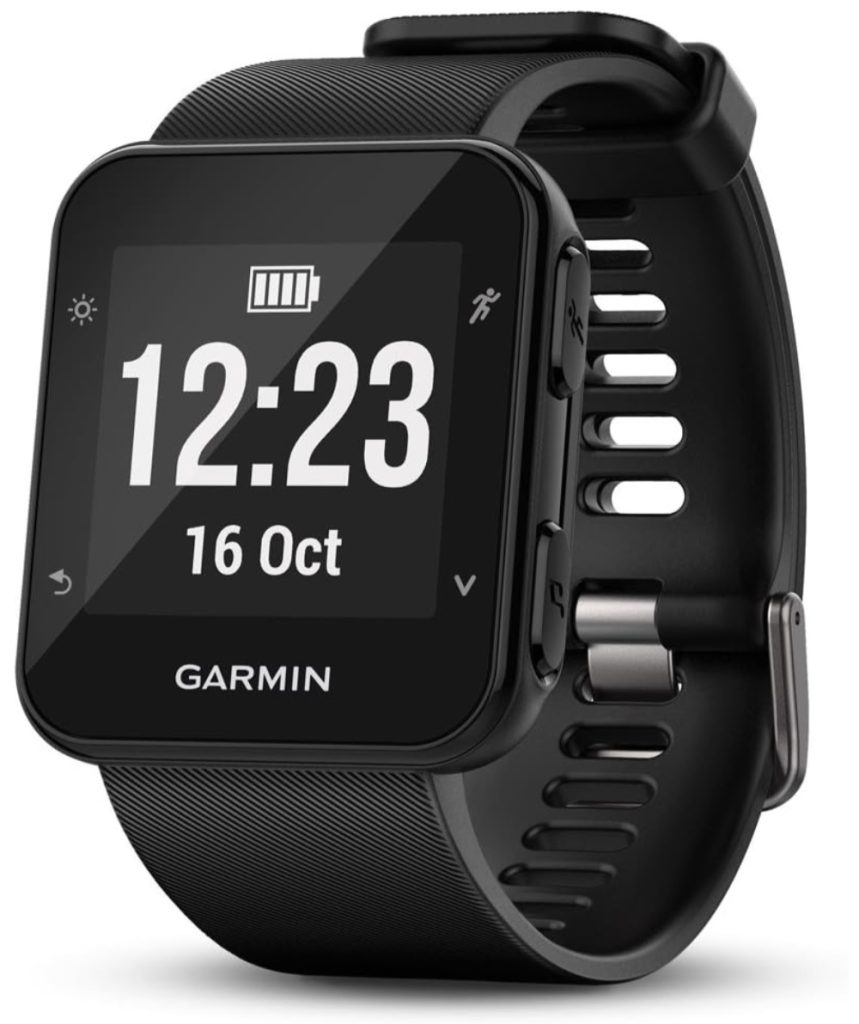
Garmin is no stranger to fitness gear, and the Forerunner 35 proves they know their way around heart rate monitors. It’s primarily marketed for runners but don’t let that fool you—it’s an excellent, simple option for seniors who need heart rate tracking without unnecessary complexities.
| Feature | Description |
|---|---|
| Design | Wrist-worn, large screen, adjustable band |
| Heart Rate Tracking | 24/7 heart rate tracking |
| Battery Life | Up to 9 days in watch mode |
| GPS | Built-in GPS for those who like walking outdoors |
| Comfort | Lightweight, easy to wear |
Pros
- Straightforward Interface: Big, clear screen with easy-to-navigate menus.
- Great Battery Life: Up to nine days means you won’t need to constantly think about charging.
- Fitness Tracking: Not just for heart rate, it tracks steps and calories, too.
Cons
- GPS Might Be Overkill: Most seniors won’t need GPS, but it’s there for those who enjoy tracking their walks.
- Bulky Design: Compared to some other models, it’s a bit bulkier on the wrist.
Who Should Consider It?
If you’re looking for a wristwatch heart rate monitor that does a little bit more—without the smartphone connection—this is a solid choice. Whether you like to walk, jog, or just keep tabs on your heart, Garmin Forerunner 35 is up for the challenge.
4. Fitbit Charge 4 (Standalone Mode)
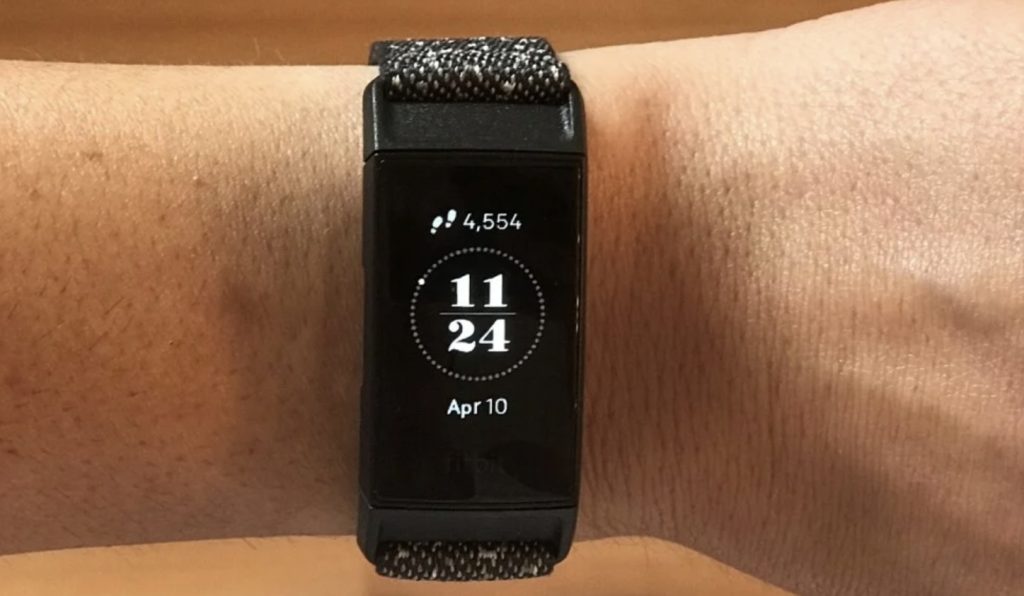
The Fitbit Charge 4 doesn’t need an introduction, but let’s focus on why it’s excellent for seniors who want to go smartphone-free. While it does offer smartphone connectivity, it can also operate in standalone mode—tracking heart rate, sleep, and more without needing constant pairing.
| Feature | Description |
|---|---|
| Design | Wrist-worn, slim and lightweight |
| Heart Rate Tracking | 24/7 continuous heart rate monitoring |
| Battery Life | Up to 7 days |
| Water Resistance | Swim-proof design, water-resistant up to 50 meters |
| Comfort | Sleek, slim, adjustable band |
Pros
- Lightweight and Discreet: Unlike bulkier models, the Fitbit Charge 4 is slim and comfortable to wear 24/7.
- Multiple Tracking Features: Tracks heart rate, sleep quality, steps, and even calories burned.
- Good Battery Life: A solid 7-day battery life keeps you going without needing to recharge constantly.
Cons
- Standalone Mode Limits Features: Without the smartphone connection, you lose some functionality, though it’s still a strong heart rate monitor.
- Screen Size: Some seniors might find the screen small compared to other devices.
Who Should Consider It?
If you want an all-around tracker that works without constantly pairing to a smartphone, Fitbit Charge 4 is a strong contender. It’s versatile, comfortable, and perfect for those who don’t want a clunky device on their wrist.
5. Wellue O2Ring
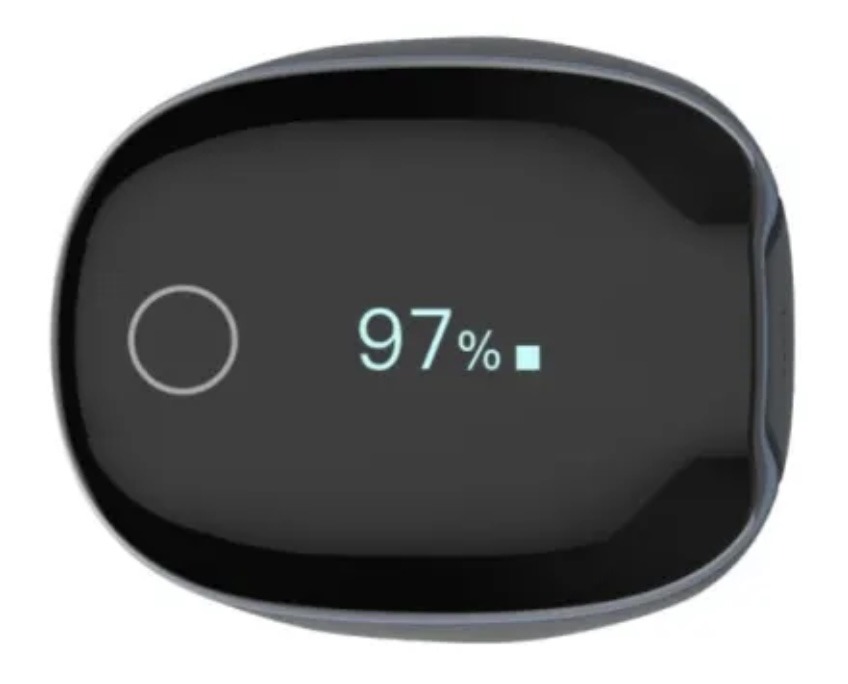
The Wellue O2Ring isn’t your average heart rate monitor; it’s designed specifically for seniors who want a blend of heart rate and oxygen saturation (SpO2) tracking. Its design is more ring-like, making it stand out for those who prefer something compact and unintrusive. The Wellue O2Ring fits snugly on your finger and tracks heart rate and oxygen levels throughout the day—or night, for those concerned with sleep apnea.
| Feature | Description |
|---|---|
| Design | Ring-style, adjustable for various finger sizes |
| Heart Rate Tracking | Continuous heart rate and oxygen monitoring |
| Battery Life | Up to 12-16 hours per charge |
| Comfort | Lightweight, non-intrusive design |
| Sleep Monitoring | Yes, tracks during sleep for issues like apnea |
Pros
- Compact and Unintrusive: The ring-style design is perfect for seniors who dislike wearing bulky watches or chest straps.
- Dual Functionality: Tracks both heart rate and oxygen levels, providing more comprehensive health monitoring.
- Vibration Alerts: If your heart rate or oxygen levels dip below safe thresholds, the ring vibrates gently to alert you—no alarms, just a quiet, personal notification.
- Ideal for Sleep Tracking: This is an excellent device for those who want to monitor potential issues like sleep apnea, offering real-time oxygen and heart rate data.
Cons
- Shorter Battery Life: 12-16 hours isn’t the longest battery life, so daily charging is necessary.
- Ring Fit May Be a Problem: Some may find it difficult to get a comfortable fit, especially those with larger fingers.
Who Should Consider It?
If you’re someone who values both heart rate and oxygen monitoring—particularly if you’re worried about sleep apnea or other nighttime conditions—the Wellue O2Ring is a great choice. Its ring design is discrete, and the vibration alerts offer peace of mind for seniors who need real-time updates.
6. Scosche Rhythm24
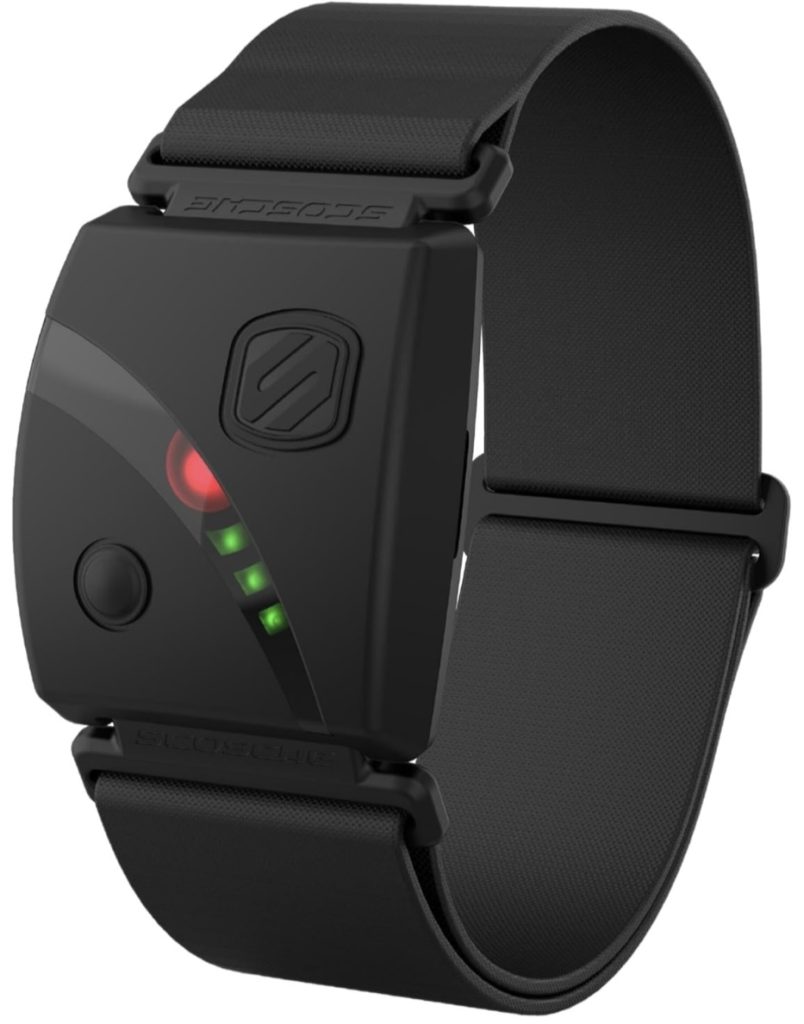
Next on our list is the Scosche Rhythm24, a heart rate monitor that straps around your forearm instead of the wrist or chest. This makes it an ideal choice for seniors who find wristbands uncomfortable but aren’t keen on the chest strap either. The Rhythm24 offers accurate, continuous heart rate tracking and some extra features, like interval training mode, without needing a smartphone for basic functionality.
| Feature | Description |
|---|---|
| Design | Forearm strap, adjustable, soft material |
| Heart Rate Tracking | Continuous, accurate heart rate tracking |
| Battery Life | Up to 24 hours per charge |
| Water Resistance | IP68 waterproof rating, suitable for swimming |
| Comfort | Lightweight and non-invasive forearm fit |
Pros
- Alternative to Chest or Wrist Monitors: For seniors who dislike traditional designs, the forearm strap is a comfortable middle ground.
- Excellent Battery Life: With 24 hours on a single charge, it’s perfect for multi-day usage without the constant hassle of recharging.
- Waterproof: Whether you’re into water aerobics or enjoy a good swim, the Rhythm24 has you covered.
- User-Friendly: Simple to wear and use, the adjustable strap ensures a secure fit without being uncomfortable or cumbersome.
Cons
- Less Convenient for Daily Wear: While the forearm design is great for workouts, it may not be the best option for all-day wear.
- More Features Than Necessary for Some: It includes modes like interval training and heart rate zones, which might be excessive for seniors seeking a basic monitor.
Who Should Consider It?
The Scosche Rhythm24 is a standout choice for seniors who want an alternative to wrist or chest heart rate monitors. It’s a comfortable fit for those who are moderately active and don’t want to deal with complicated settings. Plus, its waterproof design and 24-hour battery life make it highly functional for everyday use.
Final Verdict
Now that we’ve reviewed some of the top heart rate monitors for seniors, it’s clear that no single device fits all. Each monitor serves a specific purpose, catering to different preferences and needs.
If you’re a senior who values accuracy above all, the Polar H10 is unbeatable. For those who prefer convenience and style, the Omron HeartGuide might be more your speed. Want something light and barely noticeable? The Wellue O2Ring is perfect for continuous monitoring, especially during sleep. And for seniors who are still active, the Scosche Rhythm24 offers a comfortable, waterproof solution that doesn’t compromise on features.
| Monitor | Key Feature | Best For |
|---|---|---|
| Omron HeartGuide | Watch-style, heart rate + BP monitoring | Daily use, health-conscious seniors |
| Polar H10 | Chest strap, extreme accuracy | Seniors focused on precise data |
| Garmin Forerunner 35 | GPS + heart rate tracking | Seniors who enjoy outdoor walks/runs |
| Fitbit Charge 4 | Slim wristband, multi-featured | Seniors who want fitness & heart data |
| Wellue O2Ring | Ring-style, heart + SpO2 monitoring | Seniors with sleep apnea concerns |
| Scosche Rhythm24 | Forearm strap, 24-hour battery life | Active seniors who dislike chest/wrist |
With any of these devices, seniors can easily stay on top of their heart health without the need for a smartphone. The choice ultimately depends on your comfort, activity level, and whether you want a simple or more feature-rich heart rate monitor.
Final Word
Choosing the best heart rate monitor for seniors without smartphone boils down to your specific needs. Some prefer simplicity and accuracy, while others like a little more functionality. Whether it’s the stylish Omron HeartGuide, the super-accurate Polar H10, the feature-packed Garmin Forerunner 35, or the sleek Fitbit Charge 4, there’s something for every senior.


